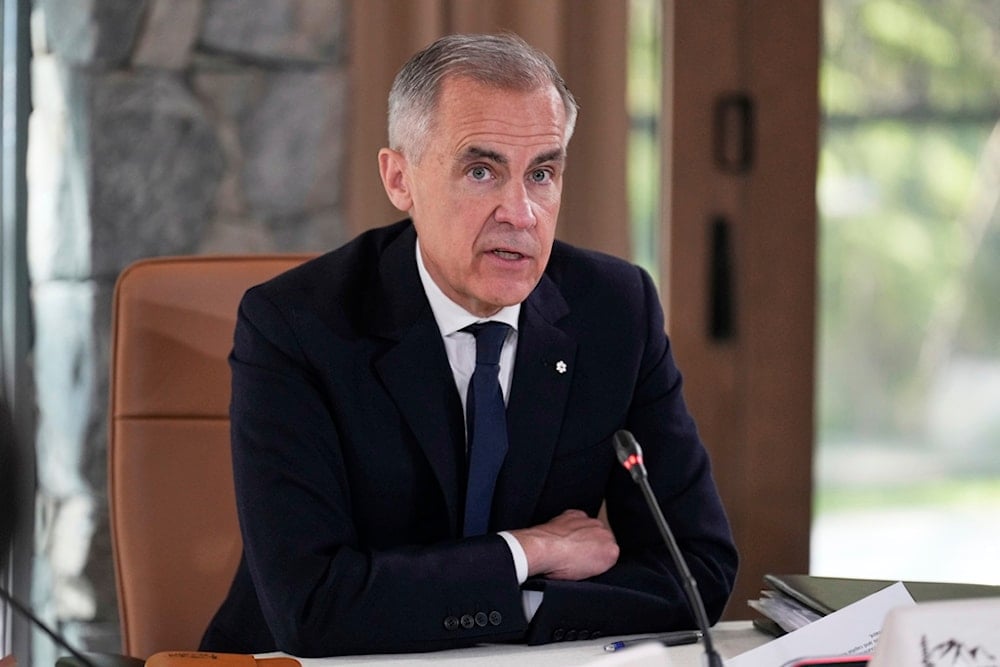Carney conditions recognition of Palestine on exclusion of Resistance
Canadian Prime Minister Mark Carney stated that recognition of a Palestinian state must begin with acknowledging the humanitarian crisis in Gaza and violations in the West Bank, but insisted that any future Palestinian government must exclude Hamas.
-

Canada's Prime Minister Mark Carney participates in a session of the G7 Summit, Monday, June 16, 2025, in Kananaskis, Canada (AP Photo/Mark Schiefelbein)
Canadian Prime Minister Mark Carney on Monday placed restrictive conditions on the recognition of a Palestinian state, stressing the need to address the humanitarian catastrophe in Gaza and the ongoing violations in the West Bank, while simultaneously rejecting any future Palestinian government that includes the Resistance movement Hamas, a position experts say reflects Western double standards and actively undermines Palestinian sovereignty.
"Well, the first thing is to recognize the scale of, and which we do and deplore, the scale of the humanitarian crisis in Gaza. Also the challenges in the West Bank, the lack of respect for the territorial integrity of Palestine and the West Bank," Carney told reporters, when asked whether Canada would follow French President Emmanuel Macron's decision to recognize the State of Palestine.
Carney said Ottawa remains committed to delivering humanitarian aid to Gaza "by all means," noting that nearly C$300 million in Canadian relief has been obstructed due to Israeli-imposed restrictions.
He further claimed that Tel Aviv had taken recent steps to ease the blockade, despite mounting evidence that critical humanitarian aid continues to be obstructed and over a hundred Palestinians, mostly children, have died from starvation as a direct result of the ongoing siege.
Despite reaffirming support for a two-state solution, Carney firmly stated that any future Palestinian government "cannot include Hamas playing any kind of role in the governance of a Palestinian state."
Resistance Legitimacy
While Western governments often brand Hamas as a terrorist organization, many across the non-aligned world recognize it as a legitimate national liberation movement that, unlike the Palestinian Authority dominated by Fatah, has actively resisted Israeli colonization.
Hamas, through its political and military wings, has refused to accept the normalization of apartheid and has built parallel state structures in Gaza under siege, providing healthcare, education, and social services while also carrying out armed resistance, which is recognized as a right under international law for people living under occupation.
In contrast, Fatah, Canada's presumed preferred interlocutor, has maintained security coordination with "Israel," repressed opposition in the West Bank, and failed to prevent ongoing land theft and settlement expansion. For many Palestinians, Fatah represents not self-rule but subcontracted occupation.
Read more: Palestinian factions warn of PA's crackdown on West Bank Resistance
Conditional Recognition
On Friday, Carney announced that Canada would engage in the process of Palestinian statehood, shortly after Macron's pledge to formally recognize Palestine at the upcoming UN General Assembly in September.
Yet Carney's insistence on excluding a central political faction raises serious questions: is Canada supporting Palestinian liberation, or merely seeking to engineer a politically sterile Palestinian entity that poses no challenge to Israeli domination?
Today, 147 countries recognize the State of Palestine. Since the US vetoed Palestine's full UN membership bid in 2024, additional states including Ireland, Norway, Spain, and Armenia have joined the call for recognition.
As momentum grows across the world to dismantle apartheid and settler-colonialism, Canada clings to a conditional framework that places the burden of "peace" on the occupied, not the occupier.

 3 Min Read
3 Min Read










